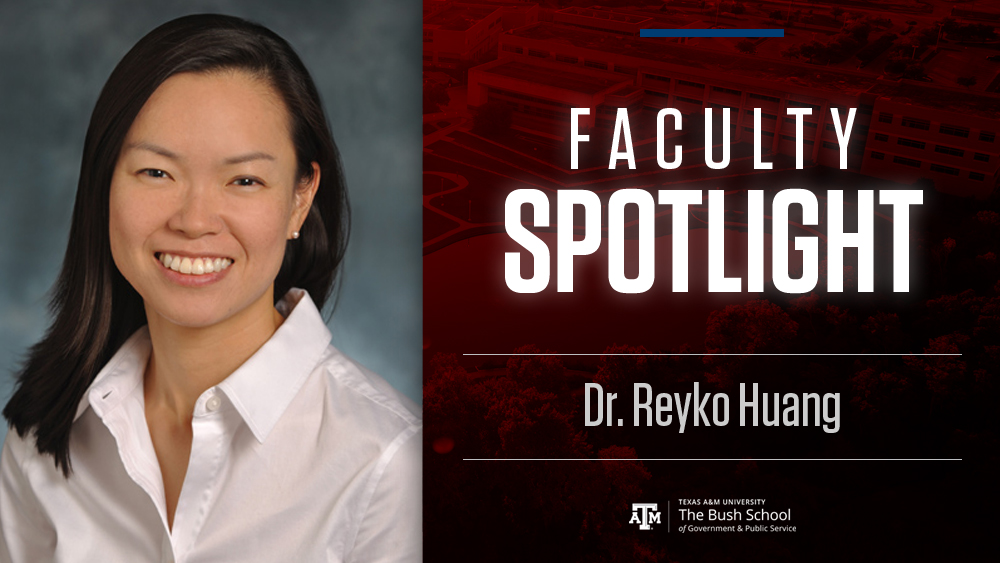
Dr. Reyko Huang is an assistant professor of international affairs at the Bush School. Her research focuses on civil wars, rebel group dynamics, state-building, democratization, and foreign interventions in conflict.
After graduating from Cornell University with a dual bachelor’s degree in government and economics, Dr. Huang spent a few years in policy research in Washington and New York. This included two years as a researcher at the International Peace Institute, a think tank that works closely with the United Nations on international security issues, where she co-edited a book on UN peacekeeping. She also attended the Woodrow Wilson School at Princeton to earn a Master of Public Affairs degree.
“As much as I loved policy work, I loved research and wanted to do my own,” Dr. Huang said. She went on to earn her PhD in political science from Columbia University.
“I grew up in a multicultural family and in several different countries. I was exposed to huge issues like poverty, income disparity, and differences in the degree of political and social rights people enjoyed across different countries – issues that made me ask, ‘Why is this happening? Why do some governments do so little to address these issues?’” Huang said. “When I began studying international politics as an undergraduate, I was hooked.” In the ensuing years, she worked on a research project on the civil war in Sri Lanka with a team at the Woodrow Wilson School, traveling to the country to conduct interviews. She also spent three months in East Timor – at the time the world’s newest country – working with the UN peacekeeping mission there.
This theme of conflict and post-conflict rebuilding is found throughout Huang’s research. She is currently working on a book project on rebel governance in civil war and its effects on post-conflict political development. “When looking at democratization after civil war, we often think it occurs because of Western interventions. There is an assumption that if outside forces don’t intervene to help states emerging from conflict, they’ll become weak, unstable, and undemocratic. My research questions this assumption and looks at the dynamics of the conflict itself that might lend themselves to post-conflict democratization. Understanding conflict dynamics is crucial if we are to have sensible policy responses. And political science offers an excellent set of tools for the endeavor.”
Dr. Huang said she pays particular attention to how rebel groups organize and govern civilian populations during the conflict. “Let’s see what happens during the war,” Dr. Huang said. “We don’t find institutional blank states in these countries after the war.” Rather, she said, wartime politics will shape peacetime politics.
In a separate project, Dr. Huang examines rebel diplomacy in civil war. She said what was fascinating is that many of these groups engage in a great deal of diplomacy in wartime, opening foreign offices and dispatching rebel “ambassadors” abroad. “They try to act like states to gain legitimacy and recognition so they can win the war and show they are actually capable of running a government,” Dr. Huang said.
Her research has been supported by the Center for International Security and Cooperation at Stanford University, where she was a Zukerman Fellow, and by the United States Institute of Peace, where she held a Peace Scholar Fellowship. She uses both statistical analysis and qualitative methods using open sources, archival material, and field interviews. Her most recent field research was in Nepal, where she interviewed participants of the country’s 1996-2006 civil war against Maoist insurgents. Her research has been published in International Studies Quarterly and in edited volumes, among other outlets.
At the Bush School, Dr. Huang teaches courses on contemporary civil wars, state-building and state failure, and transnational security issues. She teaches her courses seminar-style, emphasizing class discussion, theoretically-informed debate, and critical analysis from multiple angles. She says she likes to throw out different ideas for consideration, especially contrarian ideas and arguments that help students see an issue in a new light or sharpen their own thinking. She also challenges her students to ask, “Is this theory or argument really backed up by evidence? Is it empirically supported?”
Dr. Huang said the Bush School has been a great place to be. “My research is inspired by real-world questions. I’m academically trained but have dabbled in the policy world. So I find a lot of excitement in linking serious academic research with policy issues. And here at the Bush School, students are ambitious and do well in considering important arguments, debating them, and formulating their own thoughts,” Dr. Huang said.
Dr. Huang and her family have enjoyed getting to know Texas since their arrival. Outside of her academic pursuits, Dr. Huang also enjoys literature, poetry, good food, exploring, and making her six-month-old daughter laugh.
